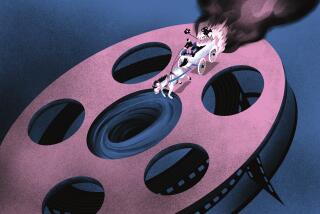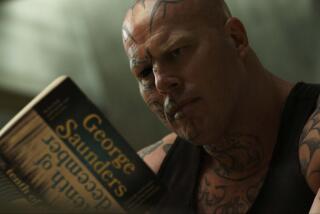MOVIE REVIEW : Director’s Cut of ‘Brazil,’ Gilliam’s Nightmare Fantasy
- Share via
“Brazilll . . . “ It was a pulsing, ecstatic ‘30s pop song by Ary Barroso. And, in Terry Gilliam’s hands, “Brazil” became a horrific and hilarious film. It was an outlaw movie in a conformist time, a nightmare comedy that laughed at the Decline of the West; a song of madness and romance, murderous bureaucracies and malfunctioning air conditioners.
Gilliam’s ferocious fantasy, now playing at the NuWilshire in Gilliam’s “director’s cut,” appeared one year after George Orwell’s 1984. But it was deliberately not set in the future.
“Somewhere in the 20th Century” is where the titles tell us we are. The clothes, the goofy artifacts, the movies, the architecture, suggest a wild polyglot stew of ‘40s film noir, ‘20s futuristic science fiction. As the movie’s beleaguered hero, a Woody Allen-ish bureaucrat (Jonathan Pryce) pursues dreams and dream girl through an increasingly chaotic world--the entire 20th Century seems to have been compacted into a single movie.
Appropriately, for a movie surrounded by tumult at its release, the “director’s cut” arrived here by circuitous paths, seven years after it was rejected by Universal, seven years after the Los Angeles Film Critics cited a shorter version for best film, director and script of 1985.
The “Brazil” the L.A. Critics saw and saved is the “Brazil” most of us know now: Gilliam’s two-hour-11-minute “compromise” version. The NuWilshire’s print is the two-hour-24-minute cut Gilliam originally delivered, the one that has played in Europe ever since.
Is it different? Definitely. The nightmare is sharper, more threatening, the characters cleaner. Most importantly, two long sequences, now restored, darken the mood, pace and tone of “Brazil’s” always furious close. One is an overlapping series of interrogations, conducted by blurry-faced inquisitors: a terrifying sequence that defines Sam’s ultra-paranoid predicament.
And there’s a harrowing scene--now one of the movie’s most memorable--in which the smiling overlord (Peter Vaughan) visits Pryce’s padded cell, wearing a Santa suit, and beamingly refuses all his pleas for rescue. In a movie packed with Christmas imagery--vacuous shoppers, inane gifts--it’s an obvious payoff, leading, quite deliberately, to a climax that almost resembles a crucifixion.
It’s a movie that stands, impishly but savagely, against the mood of its time. “Brazil,” a dark comedy about a hapless individual trapped in a super-bureaucratic society that thwarts him at every turn, was the antithesis of 1985’s macho or sex-and-success extravaganzas.
The aftermath of the “Brazil” story was ironic. Gilliam made the brilliant but wildly over-budget “Baron Munchausen,” then, with “The Fisher King,” edged back, at least temporarily, toward the mainstream. Universal, the heavy of the piece in 1985, has, under Tom Pollock, become, seemingly, one of the most progressive of the major Hollywood studios, a sometime haven for filmmakers almost as audacious as Gilliam.
In any case, “Brazil” remains, undiminished and now greatly enhanced. Just as back then, when it was an outlaw movie on embattled stages, it’s a knockout.
More to Read
Only good movies
Get the Indie Focus newsletter, Mark Olsen's weekly guide to the world of cinema.
You may occasionally receive promotional content from the Los Angeles Times.









